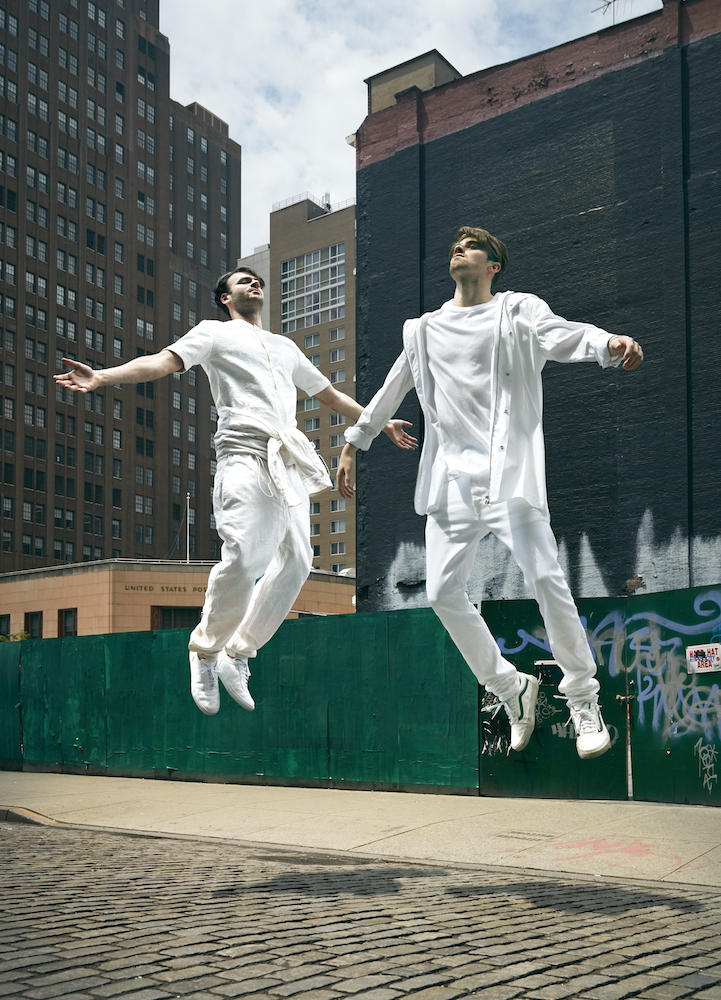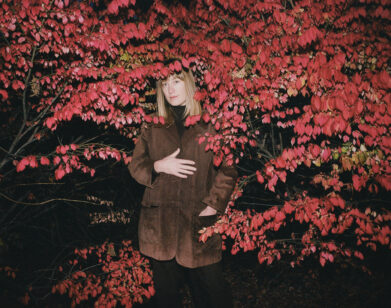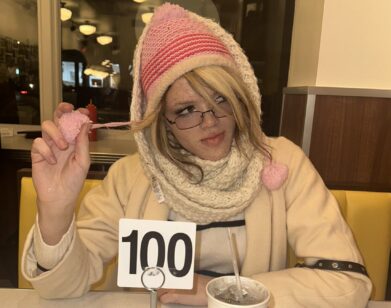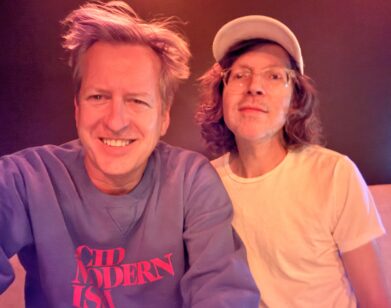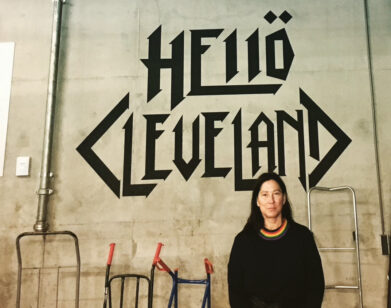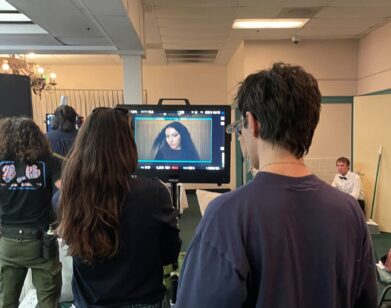The Chainsmokers
THE CHAINSMOKERS IN NEW YORK, MAY 2016. PHOTOS: JEAN YVES LEMOIGNE. STYLING: SAVANNAH WHITE. GROOMING: REBECCA PLYMATE/ART DEPARTMENT USING LEONOR GREYL AND GLOSSIER.
Yesterday, the Chainsmokers released their highly anticipated new track “Closer,” which features star-of-the-moment Halsey. Unlike their past singles—particularly “Roses” and “Don’t Let Me Down”—the soon-to-be radio banger features Andrew Taggart (one half of the duo with Alex Pall) singing. While an artist singing on their own song might seem obvious, it’s rather divergent for the pair and their DJ contemporaries, who typically rely on songwriters and vocalists to add that human element to their masterfully crafted electronic soundscapes. The band’s foray into personalizing their brand of dance music goes hand in hand with their ambition to become recognized as true artists with thoughts and feelings as opposed to faceless beat crafters standing behind a DJ booth. While artists like deadmau5 keep themselves hidden behind thick synths and earthshattering drops, Pall and Taggart are working to reveal themselves more and more each day, weaving intimacy into a genre that is too often sterile and void of emotion with the exception of drug-like euphoria. We spoke to the pair about establishing their identity, the new track, and how they plan to evolve as their audience grows.
MATHIAS ROSENZWEIG: How did you two start working together?
ALEX PALL: I was a DJ growing up. It was a hobby of mine. I was DJing around New York City and had a little career going, but it was more just side work that I was really passionate about. It’s scary being in the city pursuing something that feels more like fun than a job, and eventually—I was at an art gallery at the time—I realized that dance music was consuming my life, and I really wanted to give it a proper shot. I was working with our same manager now at that time, and then he introduced me to Drew. So we met and just immediately started working. He moved down from Maine. I quit my job and that’s where it all started.
ANDREW TAGGART: I was in college right before I met Alex and I had taken an interest in DJing. I loved electronic music way before a lot of other people did. Everyone used to make fun of me for wearing v-necks and listening to dance music when I first got to college, and then when I left, everyone was going out to see Avicii. I always made music and got really into the production side, and had started producing. There are a lot of college DJs who were getting booked around New York City and other colleges, and the opportunity was kind of revealing itself. I pursued it a little bit, put a couple of songs on SoundCloud, played a couple of shows but not many, and it was enough to be encouraged to keep doing it. I knew how successful some of these DJs were getting. The scene was so fascinating and I really wanted to get into it. I was interning at Interscope and they were kind of managing me. I went to school in Syracuse but I was planning on moving out to L.A. and trying the whole DJ thing after school. The kid who worked for Alex’s manager was like, “Hey, there’s this DJ duo called the Chainsmokers. One’s leaving and the other kid wants to bring someone else on. They play a ton of shows all the time and I think you’d be a good fit.” So I took the bus down to New York City from Maine, where I’m from, and met Alex. It was love at first site. We just literally met and the next day started grinding every day in his apartment until we hit our stride, and four years later, here we are.
ROSENZWEIG: How did you know it would work out after meeting each other?
PALL: I think we both initially knew what we brought to the table. When we talked, it was mostly about what we liked musically and what we were into growing up. Then it became a chat about how driven and ambitious we were and how badly we really wanted this. We were both very observant about what was going on around us and who was killing it and what was working and what wasn’t. Basically, it was just trying to shape an identity around this. Drew is obviously an incredibly talented producer and I had a lot of DJ gigs and that kind of marketing social thing. As we worked more and more together, it wouldn’t be like, “Hey man, I’ll see you next week. Let me know what you work on.” It was like, 9 AM to 7 PM, we got together every day and worked on music and creating our identity as artists. We didn’t want to treat it like a job, but we knew we had a lot to learn and a lot of ground to cover. Obviously over time, we’ve had the same core values, but we’re always pushing ourselves harder to become better artists, because it is a job that pays our bills, but it’s so much more than that. People relate to our music on such a deeper level, and we want that to be the case more and more. So it’s constantly a journey of self-discovery and checking yourself, and we kind of always questioned those things. Even today we were in the car coming home from a photo shoot we had and we were talking about this album concept that we had and whether it feels right and what it would entail. It’s not so much a blueprint as much as a discussion about how we feel about things. What we’ve become is so much bigger than what anyone could have imagined. In order to stay interesting and engaged in all of it, you want to keep trying new things.
ROSENZWEIG: Do you think that being a DJ duo and being in the electronic genre makes it harder to build a strong identity as artists?
TAGGART: I think yes and no. In every single genre, you have people that make stuff that sounds like the other stuff that’s popular; you have a million people competing to be the person that stands out. Obviously there are a lot of DJs and producers, but before you guys called I was working out to the “Young and Free” playlist on Spotify, and it was a different version of the same song 30 times over—young, cool, carefree with these cool, relatable lyrics. But I don’t know who the person is that’s singing it. We played that game a little bit, and you kind of have to mimic what’s going on until you’ve developed your skills to the point where you can create something that’s intrinsically yours. But I think we had kind of a breakthrough maybe a year and a half ago where we were like, “You know what, fuck it. We don’t want to make straight up dance music anymore. We’re huge music fans, we listen to everything. Why are we formatting ourselves?” That’s when we created “Waterbed” and “Roses” and “Don’t Let Me Down,” and some new songs that haven’t come out yet that really blur the lines between indie, pop music, dance music, and hip-hop.
It’s funny, because everybody only knows what we’ve put out. But if you have a big song, you want to wait and make sure that everybody hears it before you put out [another] song when you’re developing as an artist. Artistically and creatively, you’re making so much other content that no one else has heard yet. Alex and I are a year to two years ahead of “Roses,” and some people are just now hearing that and “Don’t Let Me Down” for the first time. So we’re already these different artists than people are hearing about right now. Those artists who we’re trying to become, we’re trying to write songs about us and about our lives. The next song, [“Closer,”] I’m singing on. It’s about hooking up with my ex-girlfriend and, you know, being attracted to her at first and then as soon as we hooked up knowing exactly why I broke up with her.
ROSENZWEIG: It strikes me as really unique for an act like you two or your peers to actually sing on your own songs, especially about your real lives.
PALL: We were like, “Well, why not?” And the real answer for you is because none of these people write the lyrics to their songs. We work with songwriters too but we write the songs with them—they’re about us. We sit in the room; we’re throwing our hands in. Some of the songs, we wrote the whole thing. Some of them, we’re there guiding it. It’s always different but it’s always us. Back to what we were talking about earlier, we were in the car talking about the album concept, and we’re starting to feel the pressure of an album, the fans are kind of demanding it and our label wants us to do it eventually, and we don’t want to put out an album of 10 to 12 songs that have nothing to do with one another. We’re at that point where we really need to nail down who we are today and make a cohesive body of work that illustrates that instead of just three hit singles that have nothing to do with each other, and six other pretty good songs, a couple of dance records and maybe an interlude, which is the format for every other DJ album.
ROSENZWEIG: What was it like working with Halsey on “Closer”?
PALL: She’s incredible. If you had asked us over the last year who was an artist that we wanted to work with, Halsey was number one on that list. She’s a very cool and unique artist. She has a very strong voice and she’s just very unapologetically her. That’s the kind of artist we like to work with. The song itself is something that Drew and our buddy wrote on our tour bus. We’re just very excited about it because it’s a huge step in the right direction for us as far as Drew singing and the song being produced by us, which is very uncommon nowadays in the music business. And obviously, coming off of songs like “Don’t Let Me Down” and “Roses,” I feel like it’s a good step from an identity standpoint.
TAGGART: We had this tour where we had all these really great artists on tour with us, and we were sitting in the bus one night, Alex and I. We were listening to Taking Back Sunday, to Dashboard Confessional, all these old tracks. We kind of went back to that stage when we were 14, going through our emo phase, and I think we got a little bit nostalgic and missed those really vivid lyrics. We were like, “Damn, we miss songs like this.” It’s really hard as a middle class white male to find something interesting to talk about that’s relatable and thought-provoking at the same time. I think a lot of songwriters struggle with that. We were like, “Well, fuck it, let’s write about the shit that happens to us.” I went to school in Syracuse with all these super wealthy girls that I was enamored with at first because it was so foreign to me because of where I was from in my Podunk town in Maine. I was just so unimpressed with them. I got to know them and slept with them and all that stuff, so I wanted to write a really unsexy sex song. Shawn Frank, who’s our extremely talented friend, him and I had this idea for a song. We sat down and kind of made up a story about meeting your ex-girlfriend in a bar and being so drunk with her and talking about the hookup in a very vivid way, like, “Holy shit, we’re hooking up and I know everything about you either for better or for worse.”
ROSENZWEIG: Do you feel you have a strong sense of the type of person that’s connecting with your music?
PALL: Thanks to Instagram, I can tell you exactly what it is. From what I see on social media, it’s becoming more international, which is really exciting for us. We’re seeing places like the Philippines and South Africa. It seems like we’re reaching the 16 to 25 demographic. It’s pretty split between boys and girls if I had to guess. What’s really cool for us is when we see messages from people like, “Hey, my daughter’s six years old and she loves your songs,” and they send a video of them singing it. Or even my mom walked into the room humming “Roses,” which is really cool because it shows that our music is transcending age in general. We make music for ourselves, and it’s really exciting that everyone else is enjoying it enough that they find some emotional connection to it. So we don’t care what you look like or how old you are, how young you are, it’s just that our music makes you feel a certain way.
TAGGART: What’s really interesting about it is we had to think originally. As we become bigger, we’ve grown from having a college audience to having an over 30 audience and an under 15 audience. And now next time we go around and we do our tour, we have to put on a show for all of those people. Like before, you could just put on a DJ set for a bunch of college raver kids. We need to fucking perform these songs for people. We can’t just go up there and mix them into a set and play to an arena like that. We can have some of that but we definitely feel the pressure, a good pressure for sure, to push ourselves to make it a more elaborate performance.
ROSENZWEIG: So in what ways are you changing the live show and it’s visuals to cater to your expanding audience?
PALL: I mean, that’s forever changing. As our audience expands, we have to keep pushing ourselves. With “#Selfie,” we pretty much went around the entire world once. Now we’ve probably gone around it two or three times. We bring it upon ourselves to bring a new and exciting show. It also comes down to us. We don’t want to keep doing the same things. We want to keep doing exciting things and pushing ourselves. So obviously right now, a song like “Closer” coming out, which is going to dramatically change the way our shows work, having Drew singing and stuff. Obviously, there’s always been a performance element to our show, but that’s only getting bigger and bigger. As we move forward, we’re putting on a festival, which is basically an entirely curated show, which at its heart is what anyone’s show is. But we’re really taking it a step further with the production and the short acts and obviously what we do. Our first one’s at Red Rock and it sold out like seven months in advance. And then we’re talking about this big fall tour, which will probably be in the spring of 2017, and we’re talking about mixing videos of our live show with our DJ show… We perform our songs live, which we’re really proud of because it transcends the typical DJ now. I talked to our visualist about our shows every day, about creating new content, and making things unique to us. Because I think when you get complacent is when somebody else takes your spot. It’s very much that type of hustle right now. You see a lot of these older artists that we’re big fans of take a break for a couple of years, and I’m sure they deserved it, but then they try to come back, it just isn’t the same anymore. So for us it’s all about being on the forefront of pushing new boundaries and giving people new experiences.
FOR MORE ON THE CHAINSMOKERS, VISIT THEIR FACEBOOK.

